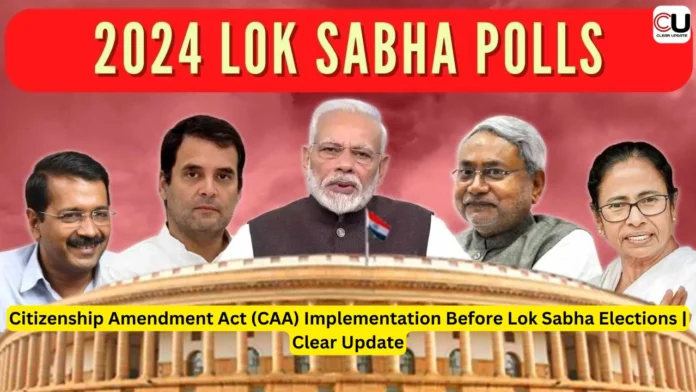Citizenship Amendment Act (CAA)
The Centre is likely to notify the rules for the Citizenship Amendment Act (CAA) before the Model Code of Conduct kicks in for the Lok Sabha elections in 2024. The rules for the implementation of the CAA, which aims to expedite citizenship for non-Muslim migrants from Pakistan, Bangladesh, and Afghanistan, are expected to be issued before the election schedule is announced. Union Home Minister Amit Shah has stated that the CAA will be implemented before the upcoming Lok Sabha elections after issuing the necessary rules.
Prime Minister Narendra Modi hinted at the enforcement of the Model Code of Conduct in March, emphasizing that the 18th Lok Sabha will symbolize the aspirations of India’s youth. He encouraged first-time voters to participate actively in the electoral process and highlighted the importance of their vote in shaping the country’s future.
Amit Shah’s Assertion and Clarifications
Union Home Minister Amit Shah’s recent assertion regarding the notification of CAA rules before the Lok Sabha elections has stirred considerable debate. Shah reiterated that the CAA is not aimed at revoking anyone’s citizenship but rather extending it to those who faced persecution in Pakistan, Afghanistan, and Bangladesh. His clarification attempts to dispel misconceptions surrounding the CAA, particularly emphasizing its humanitarian intent.
Read Also: Anant Ambani Reveals Radhika Merchant’s Involvement in Vantara Initiative | Clear Update
Timeline and Implementation Strategy
The looming prospect of CAA rules notification before the Model Code of Conduct kicks in adds an intriguing dimension to the political landscape. With March speculated as the likely timeframe for the implementation of the code of conduct, the timeline for CAA notification becomes critical. Sources suggest that the regulations are primed, with an online portal ready to facilitate the digital process. Applicants will be required to disclose their entry year into India without travel documents, streamlining the documentation process.
The CAA’s Objective and Controversies
Proposed by Prime Minister Narendra Modi’s government, the CAA aims to grant Indian citizenship to persecuted non-Muslim migrants from neighboring countries. Specifically targeting migrants from Bangladesh, Pakistan, and Afghanistan who arrived in India before December 31, 2014, due to religious persecution, the CAA seeks to expedite their naturalization process. However, its implementation has not been without controversy, evident from protests in various parts of the country.
Public Perception and Backlash
The implementation of the CAA has been met with mixed reactions, with proponents lauding it as a humanitarian gesture while opponents decry it as discriminatory. The protests at Delhi’s Shaheen Bagh and Assam’s Guwahati underscore the polarizing nature of the CAA. Despite its passage in Parliament over four years ago, delays in finalizing rules and processes have postponed its implementation.
Conclusion
As the Centre moves closer to notifying the rules for the Citizenship Amendment Act, the political landscape braces for potential upheaval. Union Home Minister Amit Shah’s assurances notwithstanding, the CAA’s implementation remains a contentious issue, with implications extending beyond electoral considerations. Amidst debates and deliberations, the fate of the CAA hangs in the balance, awaiting resolution amidst a backdrop of socio-political tensions.





[…] Read Also: Citizenship Amendment Act (CAA) Implementation Before Lok Sabha Elections | Clear Update […]
[…] Read Also: Citizenship Amendment Act (CAA) Implementation Before Lok Sabha Elections | Clear Update […]